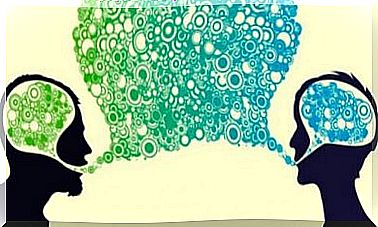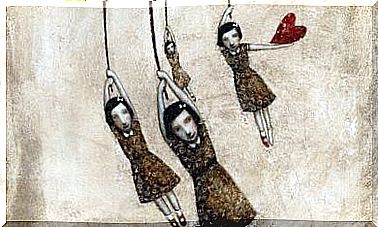The Culture Of The Victim Mentality

At some point in life, everyone has assumed the role of victim in painful or traumatic situations. We felt vulnerable, unprotected and in need of care and protection. The culture of victimization or the victim mentality reinforces this.
It ensures that the person taking on the role of victim feels comfortable and supported.
When we have experienced the care and protection of those around us, we discover that it is a nice feeling to get the attention of other people. We like to feel important and to have other people take care of us all the time.
When people react in this way, they sometimes develop the identity of chronic victim over time. With this we refer to someone who has a victim mentality. Those people think that they are always the victim and not an innocent victim in any given situation.
This identity is woven into the victimization culture in which they find themselves. People will admire us if we help those in need, even if it means losing ourselves in this process. On the contrary, if we don’t offer help, it exposes us to negative social criticism.
We would also like to note here that chronic victim mentality is not a disorder in itself classified in the DSM-5. However, it can become the psychological foundation for the development of paranoid personality disorder.

What is the role of the victim in the culture of the victim mentality?
Continuous sympathy
It is true that we often assume the role of victim when we feel sorry for ourselves. However, there are certain people who make that role a way of life. What is the reason for this? What drives a person to enjoy these negative feelings almost all the time?
The answer is simple: get sympathy and attention. When someone is a victim, sympathy occurs. This causes them to end up in a “vicious circle”. I feel bad. They sympathize with me and support me. So I continue to behave that way.
The role of society in the culture of the victim mentality
Society plays a key role in this. According to Giglioli, an expert in comparative literature and author of the book Analysis of the Victim, victimization is a cultural addition to the social laws that govern our culture.
The culture of victimization says that it is “socially good” to be seen as a victim. After all, helping people in need is considered a positive attitude.
In the culture of victimization there is a certain tendency to reinforce that role of the victim. We use phrases like: “Poor fellow,” “He ain’t got nobody,” “I have to help my own mother anyway,” or “I’d be a bad son or daughter if I didn’t help her.”
All this mixes with the fear of what others will think of us if we don’t help the other person.
External Control Orientation
People with a victim mentality really believe that everything that happens to them is someone else’s fault or just living conditions. They think, “I’m just really out of luck” or “Why is this happening to me?”
This is known as an external mastery orientation. A person is incapable of taking responsibility for his own actions. On the other hand, they always attribute the responsibility to external factors over which they have no control.
The victim mentality and negativity
People with a victim mentality often exaggerate the things that happen to them. They blow things out of proportion. This stops them from seeing the bright side of things. They are completely focused on the negative, so much so that they don’t even notice the good things.
For that reason, their problem-solving strategies have faded as a result of what happens to them. As a result, this prevents them from coming up with possible alternative solutions to their difficulties and taking responsibility for their lives.

Emotional blackmail as a form of communication
People with a chronic victim mentality try to manipulate the people around them in order to achieve their goals. For that reason, they often recognize the most empathetic people. They then focus on them and use that empathy to their own advantage to get what they want.
When that person doesn’t do what they expect, they put him or her in the role of executioner and themselves as the victim. They also say things like:
- “Everything I’ve always done for you, and this is how you reward me?”
- “Leave me alone.”
- “If you don’t, it means you don’t love me.”
All of this makes the other person feel guilty. Simply put, they are actually trying to get what they want through emotional blackmail.
What can I do if I am dealing with a chronic victim?
Whatever you do, don’t give them what they want. Don’t give it to them. Doing so will encourage the victim to continue in their “role”. It will only become a vicious circle if the people around them continue to do “more of the same”.
Expressing their needs and giving them the attention they seek will only maintain or sometimes reinforce the victim’s attitude.
You must explain to the chronic victim the reasons why you are changing your behavior towards them. Explain that you are trying to help them get out of their comfort zone. That way, the victim can see the reason for that change in you.
He or she may then also understand the benefits it provides. It basically comes down to this: “If I don’t help you and don’t give you what you want, then I’m actually helping you.”
Keep an emotional distance. Being surrounded by such negative people will wear you out. So you have to protect yourself and set boundaries. After all, your well-being is also important.
Alternative ways of acting
You can suggest them possible alternative courses of action:
- “What can you do differently than what you have done so far?”
- “What part of the blame can you accept?”
- “Are you willing to accept that you have an active role in what happens to you and that not everything is the result of bad luck or of other people?
Don’t get too involved if that person doesn’t want to change. Remember, you can’t sacrifice your own life to please someone. It is important that we give them our understanding and concern. However, that does not mean that we should sacrifice our well-being.
Remember you are not to blame. Guilt is one of the victim’s primary weapons. So it often happens that the other person feels guilty when they don’t fulfill the victim’s wishes. Remember they are using your guilt and trying to get what they want.
Learn to say “no”
Learn to say “No”. If you are not willing to do something, say “No” in a friendly but clear and firm way. Don’t give them too many excuses because the victim can use them against you.
Urge them to seek the help of a professional counselor. In the case of people with a chronic victim mentality, we recommend that they receive psychological support from a specialized expert who can really help them.
As you can see, the culture of victimization often leads us to forgo our wants and needs. We do this to help others. It is important that we are aware of this. In this way, we can protect ourselves and encourage change in the victimized person.








